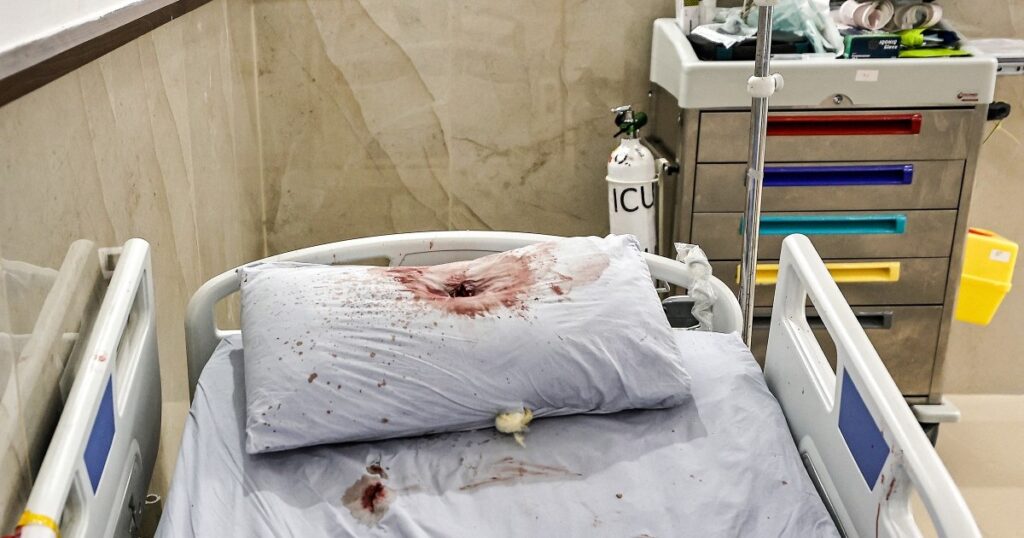This week, a video emerged showing more than a dozen Israeli special forces disguised as Palestinian civilians entering Ibn Sina Hospital in the West Bank city of Jenin and assassinating three Palestinian men, two of them brothers. spread on social media.
During the surgery, they attacked and terrorized hospital staff and other patients. Video shows them forcing bystanders to kneel at gunpoint.
Witnesses say there were no attempts to arrest the men and that they were shot while they were sleeping. One of the men was paralyzed in an Israeli airstrike on a cemetery in Jenin in November and was being treated for a spinal cord injury. A hospital spokesperson said the hospital had been attacked many times in the past, but this was the first time an assassination had occurred on hospital grounds.
But this has happened before elsewhere in the West Bank. In 2015, undercover Israeli special forces soldiers invaded a hospital in Hebron, arrested a wounded Palestinian, killed his cousin, and threatened hospital staff at gunpoint.
These secret forces are colloquially known as “mustalabim,” an Arabic word that literally means “those who live among the Arabs.” In this context, it is used for Israeli operatives who infiltrate Palestinian communities or disguise themselves as Palestinians to gather intelligence or carry out operations.
Since 1948, this unit has been made up of operatives, usually of Jewish and Arab background, who are trained to speak Palestinian Arabic, understand Palestinian customs, and dress to blend in with the Palestinian people. ing. They usually infiltrate protests to create an atmosphere of chaos and paranoia, but they also sometimes participate in special operations, such as at Jenin Hospital.
In December, a Médecins Sans Frontières (MSF) report noted an “alarming” increase in attacks on health services in Jenin, including the obstruction of ambulances and the use of tear gas on medical facilities. Access to hospitals has become so difficult that Palestinians in the Jenin refugee camp have had to set up “trauma stabilization points,” or temporary clinics where medical volunteers provide first aid and treat severe trauma. lost.
Other parts of the West Bank also saw deliberate disruption to health services. There have been several incidents where Palestinian ambulances have been unable to reach seriously injured people and medical staff have been detained for long periods of time. The situation has worsened since October, with an increase in the number of checkpoints and road closures across the West Bank.
MSF's report details what Palestinians have known for years. In short, far from being an isolated incident, the Israeli regime's attacks on Palestinian health care are systematic and part of a broader policy to prevent Palestinians from accessing medical care and life-saving treatment.
In fact, even before the genocide, the Gaza Strip's health system was in gradual decline as a result of the Israeli blockade, which severely restricted imports of medical equipment and medicines, among other things. As a result, many important and life-saving treatments, such as chemotherapy, were not available. Palestinians in Gaza were forced to apply for (and were often denied) permission for such life-saving treatment in Jerusalem and elsewhere.
Before the genocide began, the health sector in Gaza and other parts of occupied Palestine was already in a state of permanent crisis. Now, the Israeli regime's targeting of Palestinian health care has become even more explicit.
Tlalen Mofokeng, the UN special rapporteur on the right to health, said that in Gaza “medical practice is under attack”. This is no exaggeration, as there have been well over 600 attacks on medical facilities since October.
In November, Gaza's main hospital, al-Shifa, came under a brutal siege, with parts of the hospital shelled, staff abducted and interrogated, and fuel for lifesaving machines deprived.
The Israeli regime claimed that the hospital was located on the roof of Hamas's command center, but this claim provided no evidence and was widely disproved by mainstream media.
After the siege, the World Health Organization visited the site and called the hospital a “death zone.” Most hospitals in Gaza, including al-Shifa, have also dug temporary graves on the grounds of medical facilities, turning them into mass graves, as it is too dangerous to bury the dead outdoors. There are no functioning hospitals left in northern Gaza. In the south, all remaining hospitals are under heavy attack and shelling by Israeli ground forces.
Under international law, hospitals and medical facilities are considered protected spaces, and attacking them is considered a war crime. But this doesn't really matter to the Israeli regime, which has had impunity for such crimes for decades. It also doesn't seem to matter much to much of the mainstream media, which rarely mentions that these attacks are war crimes. In fact, their reporting on the Jenin hospital attack does not mention this, nor does it discuss the context of Israel's systematic attack on Palestinian healthcare.
The views expressed in this article are the author's own and do not necessarily reflect the editorial stance of Al Jazeera.

